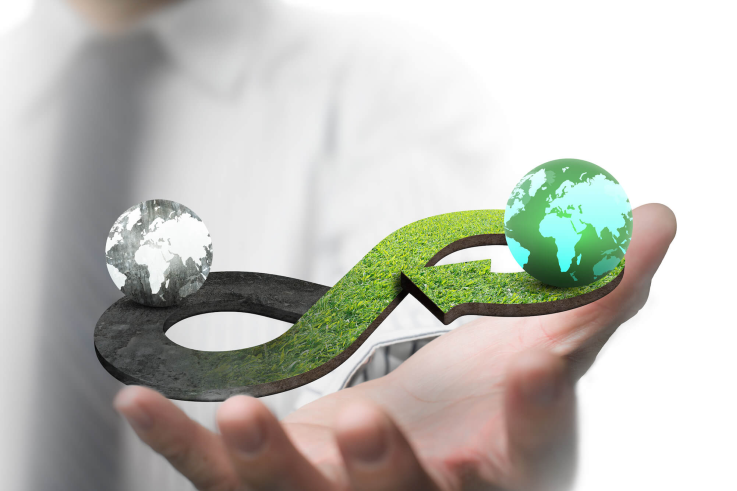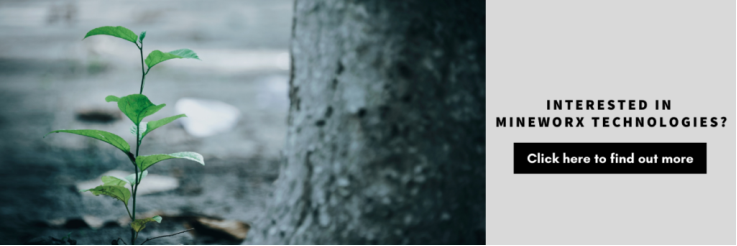
Mineworx,
Kal Tire, DRDGOLD paves the way for a circular economy
24TH NOVEMBER 2021 BY
LEON LOUW

InvestorsHub
NewsWire - November 29th 2021 - Via Core - Companies like
Mineworx,
Kal Tire and DRDGOLD
have
adapted to a circular economy without much fanfare.
Nevertheless, their
impact on the environment, the global economy and the mining
industry might be more profound than what it seems like at first
glance.
Moreover, the rise of new
recycling technology and re-mining methods could affect mineral
exploration negatively as explorers sit back and wait to see how
much recycled stockpiles will add to the global supply of minerals
and metals. As the primary mining sector starts feeling the pinch
of a green revolution, the recycling sector moves into overdrive to
emphasise its pivotal role in the circular
economy.
Greenfield exploration and
virgin mining might fall victim to a circular economy. With carbon
emissions, ESG reporting and environmental impacts now regarded as
major risks for new mining companies, the recycling of end-products
and re-mining of old tailings dams and mining dumps are looking
more and more attractive.
During the recent Joburg
Indaba, held in Johannesburg, South Africa on the 6th of October,
Bobby Godsell, mining legend and CEO of multinational mining giant
Anglo American in the 1990s, raised the issue when asked by one of
the delegates whether the new push for a greener future would not
be detrimental to exploration. "Exploration and the establishment
of new mines are certainly no longer the only way to extract
minerals and metals" Godsell said.
Virgin exploration and
mining projects have become more expensive, a lot riskier and its
environmental footprint is certainly expanding as more new projects
come online to satisfy increased global demand.
On the other hand,
recycling projects in Europe, North America and Canada, and
re-mining operations, especially of PGM's and gold, have ensured a
steady flow of dividends to its shareholders, while, at the same
time, have not burnt holes in the pockets of its owners in terms of
operational costs. What has become known as Cleantech products, are
a lot more environmentally friendly than traditional mining, while
being a pivot around which the circular economy
operates.

Defining
circularity
According to the World
Economic Forum the circular economy includes an industrial system
that is restorative or regenerative by intention and design. First,
at its core, a circular economy aims to design out waste. In
circularity, waste does not exist. Products are designed and
optimised for a cycle of disassembly and reuse.
So, any method or product
requiring inputs from outside the circular economy (like mining raw
materials), puts increased strain on the system and adds additional
waste.
The costs of finding new
deposits and mining them have increased exponentially over the
years. At the same time improved mining methods and new technology
made it possible for recycling companies to extract the same
minerals and metals at a fraction of what big extractive companies
have to dish out to keep their projects
operational.
The problem with recycling
minerals, metals and waste items like tyres until very recently,
was not only the amount of carbon the smelters and processing
plants spewed out in the recycling process, but also their
insatiable demand for a steady supply of energy. Technology by
innovative companies has addressed this problem to a large
extent.
Sustainable
solutions for the circular economy
Progressive and technology
focussed companies like TSX.V listed Mineworx (TSX.V:
MWX) in North
America, for example, has made significant strides in finding more
environmentally friendly solutions to recycle spent diesel
converters, which contains large amounts of platinum, rhodium, and
palladium (PGMs).
Although for now the
company's focus will be on getting the first commercial plant up
and running in North America in the second quarter of 2022, the
growth potential beyond the USA is frightening. The Mineworx
solution is novel and plays right into the concept of
sustainability and circularity. PGMs are notoriously difficult and
costly to mine, and extremely complex to process. Moreover, its
environmental impacts are not always mitigated effectively. Unless,
of course, it is recycled from used diesel converters or reclaimed
from historic mining waste dumps, which is the technology being
commercialised by Mineworx.
Re-mining historic
mine dumps
In South Africa (the top
producer of PGMs in the world), the extraction of valuable metals
from tailings dumps/residues/ low-grade stockpiles, traditionally
regarded as waste, has long been researched by metallurgists.
According to a report by Deloitte, several developments in mineral
processing technology have combined to make the retreatment of
numerous tailings dumps a profitable proposition.
"This is particularly the
case for tailings dumps created from the processing of platinum
group elements (PGEs) from the UG2 reef in the Bushveld Complex
(BC) of South Africa, which are now being retreated to recover
chrome.
Similarly, tailings dumps
arising from the processing of chrome ore in the Lower Group reefs
of the BC are also being retreated to recover PGEs. For example,
London listed Pan African Resources (PAR), operated the Phoenix
platinum reprocessing plant for a number of years before selling
the asset to Sylvania Resources in 2017. Today, PAR runs the
Elikhulu gold reprocessing plant and the Barberton Tailings
retreatment plant in the Mpumalanga province of South Africa very
successfully.
DRDGOLD, another South
African company, has been re- mining gold tailings and waste in and
around the historic mines of Johannesburg for many years. DRDGOLD
has refined and almost perfected their extraction and processing
methods to such an extent that they are able to mine some of the
lowest grade materials in the world. In the process, they have
morphed into a technology company rather than a traditional mining
company. DRDGOLD has played an important role in mopping up the
environmental legacy left by historic gold mining companies on the
reef. By doing so, it has become one of the first companies that
can truly claim to have played a role in the circular economy of
South Africa.
Tyres
and sustainability
There are other great
examples (not necessarily in the primary mining space) where
Cleantech technology is used to liberate materials through
efficient recycling that would normally have remained locked-up in
the final product in the past. Canadian headquartered Kal Tire, a
tyre service company, retreats and recycles used tyres.
The company recently
opened its new off-the-road (OTR) tyre facility in Antofagasta,
Chile, where two thermal conversion reactors will be used to
dispose of scrap tyres. The OTR solves one of the most pressing
environmental issues for large mining companies: getting rid of
their used tyres.
Determined to provide a
quality scrap tyre solution in Chile, in 2015 Kal Tire began the
process of studying, engineering and even building the equipment so
it could offer thermal conversion recycling. The process uses heat
and friction to induce a reaction that converts tyres into their
base elements (fuel oil, steel, and carbon black) so they can be
reused.
The green economy has
opened-up numerous opportunities for innovative solutions to solve
environmental problems. Mineworx and Davis Recycling, its JV
partner, recently tested a 100L pilot plant, and has shipped it to
Tennessee in the upper south of the USA.
As smelters have become
increasingly reluctant to take in spent converters, Mineworx saw an
opportunity to extract PGMs in a more environmentally friendly
manner to contain excessive carbon emissions. About 80% of the
world's platinum and close to 50% of its palladium, goes into
manufacturing diesel catalytic converters.
This is ground-breaking
technology, and Mineworx is first to the market. The commercial
plant, once in full swing, will produce approximately ten tonnes of
spent converters per day and revenues are expected to exceed USD100
million. These are phenomenal numbers from a business perspective,
considering that the recycling of converters is currently (with old
technology) worth more than USD25-billion.
According to Greg Pendura,
CEO of Mineworx, revenues will start showing on the balance sheet
in the fourth quarter of this year once the pilot plant in
Tennessee gets into the swing of things.
The move towards
decarbonisation and a renewed focus on ESG's have played right into
the hands of established recycling companies like
Mineworx.
Over the last 10 years or
so, PGMs have been consistently short on supply. The world's mining
operations alone cannot meet or sustain global demand for PGMs.
This has created space for recycling to help meet the shortfall.
Moreover, sourcing recycled metals is generally cheaper than mining
and generates up to 90% less CO2.
In a new normal, where
climate change, biodiversity, circularity, rehabilitation and ESGs
have become the buzz words, research, and development in the
circular economy, especially in the recycling sector, will become
paramount.
Although mining new
deposits will always be the bedrock on which the mining industry is
built, the rise of recycling, re-mining and innovative CleanTech
companies like Mineworx, should not be underestimated. In the
not-too-distant future these types of extraction companies might
affect direct exploration spend, as an oversupply could sterilise
growing stockpiles.

Source - https://www.coreconsultantsgroup.com/mineworx-kal-tire-drdgold-paves-the-way-for-a-circular-economy/